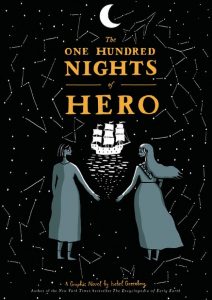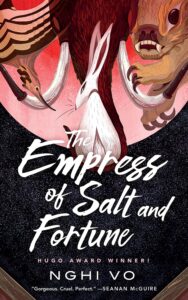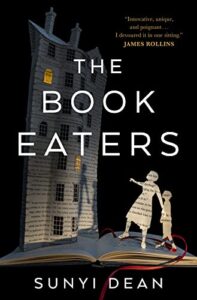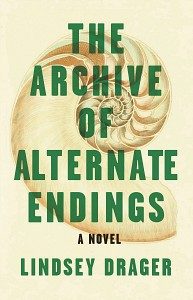We all have our preferred coping methods. Mine is returning to comforting favorites: books that changed me, those old familiar stories that still move me, no matter the intervening years.
These last seven years, Isabel Greenberg’s graphic novel The One Hundred Nights of Hero has been waiting quietly for me to pick it up again. The book itself is oversized, a choice I like to think foreshadows its impact, but let me tell you more about its insides first.
The One Hundred Nights of Hero is a collection of stories set within a love story about two women defying a patriarchal empire. The art is sketchy but striking, with a limited color palette of red, gold, and teal, enhancing black, white, and gray. The prose conveys the same style—simple and striking—with the added zing of snark, allowing the story itself to shine.
The prologue opens with a world creation myth. Early Earth was perfect, but this soon changes due to a God’s meddling. This God, Birdman, fanatically desires worship and adoration. “See these humans Kiddo has created… Happily breeding. Left, right and centre. NO MORE! I shall give them ME. They will learn to fear me, they will learn to do my bidding… They will worship me.”
Properly furnished with this context, we arrive at the city of Migdal Bavel in the midst of a fireside conversation between Manfred and Jerome. Here, devotees of Birdman hold sway and women are seen as little more than amusing possessions, forbidden from learning to read and write.
We learn of Manfred’s difficulties with women. Alas, after he killed his first wife for being assaulted, he’s unable to find a woman who meets his highly specific criteria: “Beautiful. Clever enough to have a conversation, not clever enough to disagree with [him]. Obedient. Chaste. Good at mending socks. NOT ambitious. Marriage to [him] must be the height of her ambition. Interested in [his] passions. Falconry, battlements, maps, etcetera. But not as good as [him] at those things.” Hearing this, his friend Jerome points out that his wife, Cherry, is all of those things. And so he sets a ludicrous wager. He will give Manfred one hundred nights to attempt to seduce his wife Cherry, who is so incredibly chaste that even he has not “taken her virtue.”
Years before this shameful fireside chat between Manfred and Jerome, Cherry fell in love with her maid, Hero. They shared a single wonderful summer together before Cherry was forced into marrying Jerome. Now, faced with a similar seemingly inescapable situation, they come up with a bold plan. They will distract Manfred with an enchanting story every evening for the next one hundred nights, in the grand tradition of One Thousand and One Nights.
The graphic novel unspools from there, Hero telling story after story to a rapt Manfred and an anxious Cherry. We learn mysterious and tantalizing tidbits about Migdal Bavel and Hero. Some stories are familiar but end in a new way, such as the Twelve Dancing Princesses. Others are wholly new, like the story of the Secret League of Storytellers, a group of women who resolve to tell “…all the stories that are never told…And above all, stories about brave women who don’t take shit from anyone.” The guards are enthralled too, and soon the entire city of Migdal Bavel whispers about Hero’s stories.
(Spoilers, highlight to read) When Jerome returns home on the one hundredth night and Cherry’s virtue remains intact, Manfred screams witchcraft, and the women are taken to the tallest tower… You can imagine the end that awaits them there. I refuse to spoil it for you, but know that I cried in queer despair and joy.
There is so much to love in Greenberg’s graphic novel. There are beautiful repetitions and throughlines, like women not being sorry, not even one bit, like brave women who don’t take shit from anyone, and recurring devices like a magic pebble. These stories unfurl, less in a linear progression and more in a self-referential spiral, all adding up to inform the gorgeous ending.
I’ve carried the bold and unrepentant spirit of The One Hundred Nights of Hero’s love story with me since the first time I read it in 2017, and I hope you choose to do the same.
Warnings: misogyny, nudity; mentioned but not depicted: sexual assault, violence




